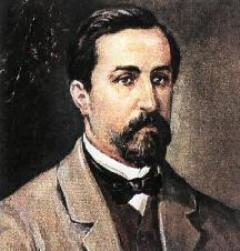Alexander Borodin – Petite Suite-In The Steppes of Central Asia
Alexander Borodin – Petite Suite-In The Steppes of Central Asia

Petite Suite
1. In The Monastery
2. Intermezzo
3. Mazurka In C
4. Mazurka In Db
5. Dreams
6. Serenade
7. Finale. Scherzo - Nocturne – Scherzo
USSR Symphony Orchestra 1985
Evgeny Svetlanov – conductor
In The Steppes of Central Asia
Tchaikovsky Large Symphony Orchestra
Vladimir Fedoseyev - conductor
Borodin wrote little enough -- an opera, a couple of symphonies, a tone poem for orchestra, a couple of string quartets, a string quintet for chamber musicians, and a handful of songs for voice and piano -- and next to nothing of any substance for the piano alone. The largest of his piano works is the Petite Suite, seven brief movements composed over a period of five years, dedicated to the Countess Louise de Merci d'Argenteau and published in 1885. Following Borodin's death in 1887, Glazunov edited and orchestrated a number of his works, including the Petite Suite. In Borodin's autograph, the score bears the dedication "Petit poeme d'amour d'une jeune fille" (Little poems on the love of a young girl). Each movement of the work also has a brief explanation following it. The austerely liturgical first "Au couvent" (At the Convent), "The Church's vows foster thoughts only of God"; the shyly charming second Intermezzo, "Dreaming of Society Life"; the grandly joyous "Mazurka I," "Thinking only of dancing"; the lyrically romantic "Mazurka II," "Thinking both of the dance and the dancer"; the voluptuously lyrical "Reverie" (Dreams), "Thinking only of the dance"; the sensually chaste Serenade, "Dreaming of love"; and the closing romantic Nocturne, "Lulled by the happieness of being in love." Clearly, Borodin had a specific program for the whole work, a work that is part dance, part dream, and all love. ---James Leonard, Rovi
Borodin wrote the symphonic sketch “In the Steppes of Central Asia” in 1880, for an event to mark the 25th anniversary of the reign of Tsar Alexander II. It is one of his most popular works, giving a convincing picture of the approach and disappearance of a camel train in the empty desert wastes of central Asia. Quite how he achieved this is a bit of a mystery, since despite being well-travelled, he never went within 1,000 miles of the region he depicted so well!
The composer himself provided the following programme: “In the silence of the monotonous steppes of Central Asia is heard the unfamiliar sound of a peaceful Russian song. From the distance we hear the approach of horses and camels and the bizarre and melancholy notes of an oriental melody. A caravan approaches, escorted by Russian soldiers, and continues safely on its way through the immense desert. It disappears slowly. The notes of the Russian and Asiatic melodies join in a common harmony, which dies away as the caravan disappears in the distance.” String harmonics, haunting woodwind solos and triumphant bell-like passages combine to form this fleeting musical tableau. --- bhco.co.uk
download: uploaded anonfiles mega 4shared mixturecloud yandex mediafire ziddu
Last Updated (Wednesday, 11 September 2013 13:45)








